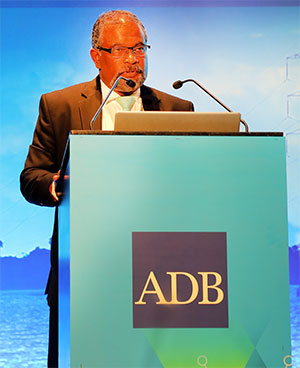By Sanath Nanayakkare
Given the extremely difficult fiscal conditions Sri Lanka is experiencing, there is no room for complacency or reversal of the key economic reforms underway because business as usual is no longer tenable for Sri Lanka, Treasury Secretary Mahinda Siriwardana warned in Colombo on Tuesday
He said so while speaking at the Serendipity Knowledge Programme (SKOP) which is an Asian Development Bank (ADB) platform dedicated to identifying knowledge solutions for Sri Lanka’s development challenges. The event was held at Shangri La Colombo where the welcome address was delivered by Kenichi Yokoyama, Director General, South Asia Development, ADB. The keynote presentation on SOE Reform: Lessons from other countries was delivered by Dag Detter, former President of Stattum and Director Ministry of Industry Sweden. Suresh Shah, Chairman, SOE Restructuring Unit was among the eminent panelists that delved deep into SOE reforms: Challenges and Opportunities for Sri Lanka.
Speaking further the Treasury Secretary said:

Treasury Secretary Mahinda Siriwardana
“Divestiture of SOEs is being discussed at a time Sri Lanka is experiencing its worst economic crisis since its independence which led to far-reaching economic and social ramifications. The government has taken a series of measures to stabilize the economy and gradually restore economic growth in a sustainable manner going forward while implementing critical economic reforms. In the present context, there is noroom for complacency and there is no margin for error by reverting to unsustainable policies and practices of the past.”
“As in many developing and emerging economies Sri Lanka’s SOEs have contributed to the ongoing crisis although they have shown a mixed record of their contribution to the economy. While some sectors like state-owned banks make an important contribution to the economy, several SOEs in sectors such as energy and transport have created persistent losses. SOEs are vulnerable to mismanagement and corruption because of potential conflicts within the ownership and the policy-making functions of the government and undue political influence on their policies, appointments and business practices. Also, their internal controls, monitoring and the government’s frameworks are inadequate to deal with these issues. Many of these institutions have pursued a monopolistic position in the market hindering private investment. Price-fixing, inefficient management and poor entrepreneurship have weakened public finances turning these institutions into national burdens dependent on the tax payers, therefore the success or the failure of these SOEs has had a significant impact on the economy as a whole. Highly loss-making SOEs such as CPC, CEB and Sri Lankan Airlines pose significant fiscal issues as their losses have to be addressed through Treasure transfers or public debt. Loss-making SOEs also create vulnerabilities in the banking system because the accumulated debt is often funded by the state banks. This has created a complex interaction between the balance sheets of these institutions, the banks and the government. All these challenges require comprehensive reforms which have been delayed for a prolonged period and have resulted in significant macroeconomic vulnerabilities. As indicated in the interim budget speech in 2022, these difficult but necessary measures pertaining to SOEs will no doubt pose challenges in its implementation, but failing to do so will have catastrophic risks in financial stability and even higher taxation burdens in the future. This is why the restructuring of SOEs is critical in terms of government revenue and expenditure. In making the necessary reforms, learning from the success stories from the neighboring economies and the rest of the world would be of great importance to us. Globally, countries have increasingly moved away from state-led development strategy, encouraging private sector to engage in business with the government making the proper policies and regulatory frameworks without compromising the long-term interests and the wellbeing of the public. To achieve these objectives the government is making progress in several key reform areas. One of them is the cost-reflective pricing of utilities and petroleum products, Sri Lanka being a net energy importing country. However, this creates hardships to the poor and the vulnerable. So the government has chosen the strategy of providing direct cash transfers and other measures of relief to those objectively identified segments of the society instead of underpricing utilities across the board. This approach will also minimize inefficient energy use by more affluent consumers.”
“Reform number two is balance sheet restructuring. The foreign-currency denominated loans guaranteed by the sovereign on behalf of CPC and most of the same of CEB, Sri Lankan Airlines and RDA will be restructured eliminating the risks and mismatches to the fiscal sector.”
“Reform number three is introducing competiveness in key economic sectors by driving productivity of these enterprises. An example for this is Sinopec, another player that entered the petroleum retail space last week. At the same time, the government has undertaken an initiative to unbundle operations at the CEB where ADB is playing a key role. This will lead to greater operational and financial indicators of electricity generation and distribution activities enabling competition within the entity, improved transparency through bulk supply transaction accounts to get better outcomes for consumers as a whole. The automation of obsolete manual reading of meters would benefit consumers through predictable and timely readings while improving efficiency of the workforce.”
“Divestment of non-strategic assets is the key reform number 4 to drive economic activity in this area. The approval of the Cabinet has already been given for divestment of several entities and transaction advisories have been appointed to support the programme in a transparent, professional manner.”
“Reform number five is governance and legislation to avoid the recurrence of financial vulnerabilities in SOEs. In this exercise, an overarching legal framework will be brought in to ensure proper appointments of SOE board members and other senior management, regular publishing of financial reports, due diligence over procurements and the upholding of corporate governance principles.”








